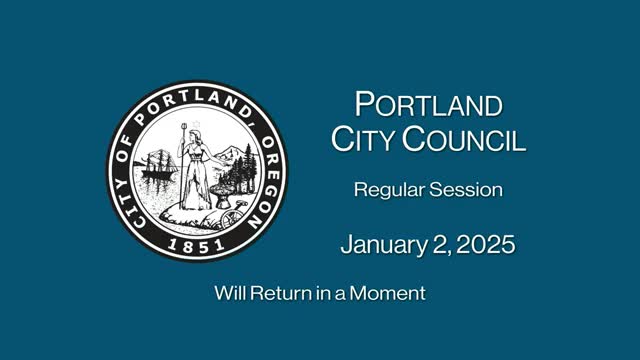Public speakers press council for shelters, crime response and transparency on police payouts
Get AI-powered insights, summaries, and transcripts
Subscribe
Summary
Public testimony at the Jan. 2 Portland City Council meeting focused on homelessness, public safety and business impacts: business owners described repeated theft and violence, advocates pressed for transparency on police misconduct settlements, and health and community leaders urged wraparound services alongside shelter capacity.
Multiple public speakers at the Jan. 2 Portland City Council meeting urged immediate action on homelessness, expanded shelter capacity and clearer accountability for police misconduct and settlement transparency.
A business owner near Providence Park described repeated shoplifting, vandalism and threats, saying her store suffered thousands of dollars in losses and that employees regularly face harassment. The speaker asked for stronger enforcement, suggested outsourcing some enforcement work to private security and stressed penalties for repeat offenders.
Corey Seamer, describing lived experience with addiction-related homelessness, told the council that “addiction related homelessness is directly linked to the public safety issues in my neighborhood,” and urged the council to continue outreach while also addressing criminal behavior tied to active substance use. He said enforcement and the availability of overnight shelter beds should be part of the response.
Dan Handelman of Portland Cop Watch urged transparency around settlements for police misconduct, noting a charter change that gives the city administrator authority to resolve lawsuits under a higher threshold. Handelman said it is “imperative” that the council ensure transparency about the cost of police misconduct so the public can see how taxpayer dollars are used and so underlying policies can be reviewed.
Health care and community representatives also testified. Eric Weiser, a physician and board member of Neighborhood House, said housing-first approaches must be combined with “wraparound” services — including health care, mental health and case management — to address the root causes of unsheltered homelessness. Peyton Chapman urged the council to “center children and families” in planning for safe public spaces and community facilities in the city.
Councilors acknowledged the testimony and said they will work with the mayor and county on shelter capacity, outreach strategies and public safety responses. Several councilors also pressed for a governance approach that balances urgent operational needs with long-term public engagement and oversight.
Why it matters: Public testimony captured the intersection of homelessness, addiction, public safety and business concerns in Portland neighborhoods. Speakers pressed the city for both immediate beds and longer-term services and policy changes, and for greater public transparency on police-related payouts.
What’s next: Council members said they will pursue follow-up with bureaus and with the mayor’s office on shelter openings, outreach and enforcement strategies; multiple speakers said they would continue to press county and city leaders for resources.
